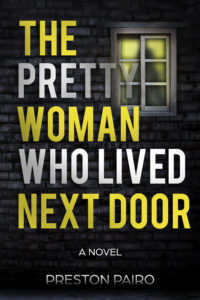Preston Pairo's Blog, page 2
February 2, 2020
Florida: Forget the Weather, It’s the News

Forget
overstated (if not borderline fraudulent) tourism-bureau promises of sunny
days, warm temperatures, and other tropical delights that lure vacationers,
snowbirds, and down-on-their luck types certain that relocating to Florida will
turn around their life. The state that
boasts the southern-most point in the continental U.S. shouldn’t market itself
on its climate and theme parks, but its ability to generate entertaining news.
In the span of a few days in January 2020, the Palm
Beach Post reported the following fantastic stories:
● A former West Palm
Beach stripper recruited to be a pharma sales exec was sentenced to a year in
prison for her “role in using her sex appeal to bribe doctors to prescribe
dangerous fentanyl spray to patients who didn’t even need it.” No word on any disciplinary or legal action
against any of those doctors, presumably because it’s tough making a living in
medicine these days and they need those little side gigs.
● After overnight temperatures at Palm Beach
International Airport dipped to a not-so-balmy 41 degrees, “Iquanas dropped
from the sky like living hailstones…”
Seems the cold-blooded fellows tend to be stun-gunned by chilly temperatures
and lose their grip on the trees where they’re sleeping.
● A Palm Beach Atlantic University biology class
collecting water samples along a canal trail “found a man’s body.” When bodies are discovered in Florida it is
apparently assumed, and therefore need not be immediately specified in the news
article, that the body is dead.
● 74-year-old rock icon Rod Stewart, perhaps
tussling above his bantamweight class, entered a plea of not guilty for
(according to police statements) throwing a punch that struck a security guard after
Stewart became “agitated when (his) family was denied access” to an event at
the equally iconic Breakers Hotel.
All this on top of rampant local government
corruption, con men returned via extradition to face charges of defrauding naïve
residents who moved to Florida hoping to change their luck, and multi-million/billionaires
entangled in massage parlor stings and other random acts of misdemeanor sexual
folly.
So, beware when visiting South
Florida: if the Palm Beach Post is delivered with breakfast, you’ll be
lucky to be out of your room before noon.
September 1, 2019
Are School Start Times Lunacy?

As Maryland launches its public school students into another
year of awakening at the crack of dawn, a question worthy of conversation is
whether these daily start times are in kids’ (or society’s) best interests.
Consider the opinion of Matthew Walker, Professor of Neuroscience and Psychology at
the University of California, Berkeley. Okay, sure, Berkeley, a location sure to cause
eyerolls from some. But in his book, Why
We Sleep: Unlocking the Power of Sleep and Dreams, Walker writes:

“More than 80 percent of public high schools in the
United States begin before 8:15 a.m. Almost
50 percent of those start before 7:20 a.m. School buses for a 7:20 a.m. start time
usually begin picking up kids at around 5:45 a.m. As a result, some children and teenagers must
wake up at 5:30 a.m., 5:15 a.m., or even earlier, and do so five days out of
every seven, for years on end. This is
lunacy.”
It seems it’s all about those circadian rhythms, which are undeniably
as much a part of us as breathing. And
kids are biologically-disposed late risers.
So what happens when they head off to school with all the latest tech
gadgets, but not enough sleep? According
to Walker:
“Controlled sleep laboratory studies…show that children
with longer total sleep times develop superior IQ, with brighter children
having consistently slept forty to fifty minutes more than those who went on to
develop a lower IQ.”
And it’s not just about SAT scores. Without sufficient REM sleep (the really good
stuff that conjures up dreams) Walker says:
“REM sleep is what stands between rationality and
insanity. Describe (symptoms of moodiness, anxiety, and paranoia) to a
psychiatrist without informing them of (a child’s) REM-sleep deprivation
context, and the clinician will give clear diagnoses of depression, anxiety
disorders, and schizophrenia.”
Not to mention:

“When the Mahtomedi School District of Minnesota pushed
their school start time from 7:30 to 8:00 a.m., there was a 60 percent
reduction in traffic accidents in drivers sixteen to eighteen years of age.
Teton County in Wyoming enacted an even more dramatic change in school start
time, shifting from a 7:35 a.m. bell to a far more biologically reasonable one
of 8:55 a.m. The result was astonishing—a 70 percent reduction in traffic
accidents in sixteen- to eighteen-year-old drivers.”
Now, Walker’s website is sleepdiplomat.com, and as a “sleep
scientist,” his book may at times seem to lean toward theories that all the
world’s ills could be cured by a good night’s sleep (which just happens to be
his specialty), but his claims, if nothing else, are worth considering as you
drag your kids from bed before sun-up to get them to school.
August 17, 2019
A Father Sees The Future

In 1977, a father who could glimpse the future told this to
his son while fishing off a dock in Ocean City, Maryland:
“There will come a day in your lifetime, maybe not when
you’re my age, maybe when you’re Pop’s age, that you will feel almost
overwhelmed by the accumulation of all that will have changed since today.
“As improbable as it may seem, there will be computers, not
just in everyone’s house, but in everyone’s hand. Like Dick Tracy’s watch, only beyond.

“Kids your age won’t be outside so much like they are
today. They won’t play like you
play. They’ll be in their rooms, with
their computers in their hands, playing games and talking to one another and sending
messages to people on the other side of the world.
“And they won’t send messages with full sentences or correct
spelling, the way we have you write thank you notes. And they’ll be more shy, because they’ll lack
experience looking other people in the eye the way we tell you to when you talk
to adults or your teachers.
“And the kids’ parents, especially their grandparents—you’ll
be a grandparent then—will say how wrong it all is, and how everything was so much
better today. Which is what all parents
and grandparents say when their kids and grandkids are different than they were
growing up. Because every generation has
its own identity and its own ego, and thinks they do things better than anyone
who’s older.
“And all the while, the earth smiles. Because all these changes mean nothing,
really. Not to the earth. To the earth, lifeforms come and go. One day we’ll be as extinct as the
dinosaurs. And when that day comes, the
earth will let out a sigh of relief and have a nice rest until the next forms
of life come along.”
March 31, 2019
Closed For Your Convenience
Five Minute Fiction by Preston Pairo

It starts out well
enough. The bank teller asks me: “Good
morning. Welcome to Bancs of the
Americas, how may I assist you?”
“Hi.” I slide my
deposit slip and endorsed check through the flounder-thin opening in the inches-thick
(presumably bulletproof) window that separates us. “I just have a deposit.”
“A what?”
Assuming my words did not penetrate the protective divider
that guards bank employees from criminal elements, I repeat: “Just a
deposit.” I point to my paperclipped
check and deposit slip which are now on his side of the barrier.
“Yes,” the teller responds, “I heard you the first
time. I’m just not sure what you mean
by…” He pauses as if preparing to
pronounce a tricky phrase, then, one syllable at a time carefully enunciates:
“…de-pos-it.”
Unsure how to better define the transaction, I repeat,
“Deposit…” but add the always helpful: “…you know.”
The teller wants to sigh in the worst way. Inside the confines of his neatly-pressed
dress shirt, his shoulders are begging to sag.
His bushy unified eyebrow wants to raise. His eyes crave to roll. But he maintains his composure—almost. “Sir…”
He utters the word as if it is a slur, which is how he intends it: that
passive aggressive politeness of those required to deal with the public on a
regular basis. “…let me get my
manager.” He begins to slide off his
stool, a slow pivot of waist and thighs that indicates this is not going to be
a quick or happy process.
In vein, I utter to his back, “It’s just a deposit.”He pretends not to hear me as he proceeds slowly down the aisle behind a line of fellow tellers at a pace of pretend efficiency. His hipster pants are a color somewhere between grey and camel, the legs narrow as tights all the way to his ankles where the fabric bunches atop caramel-colored loafers.
My helpless waiting begins.
That internal debate how long to give the manager to show up. Weighing time already invested getting this
far against heading home and starting from scratch tomorrow.
I’ll give it five minutes.
No ten. No, five, but not a firm
five. A re-evaluate in five.
In the meantime, I look around for someone else who is
depositing a check. Maybe I could ask their
teller for help.
Immediately to my right, a customer is opening a new credit
card account her teller says pays three-percent on gasoline purchases for the
first six months, making it sound as if using the card will make the customer
rich.
The next teller is consolidating a couple’s small business
loan and home equity line of credit and keeps referring to the equity line as a
“Heloc” as if it is some type of magical enchantment from a faraway land.
On my other side, a teller is resetting a customer’s PIN in
order to allow online transfers between the customer’s various banking
wallets. Further eavesdropping informs
me these so called “wallets” are actually the customer’s checking, savings,
investment, retirement, and money market accounts. The teller insists that once this PIN is
reset the customer will be able to do all imaginable forms of banking at home
in his pajamas. (I wonder how the teller
knows the man wears pajamas.)
A fourth teller is creating a new online profile for a customer so he can conduct all of his financial, social, and retail transactions on the bank’s new app: FYC, which is pronounced Fick and means: For Your Convenience.
I don’t see a single check being deposited by the time the
manager appears. Behind that imposing
pane of security glass, he is a serious-looking man in his early-40’s, dressed
in a dark suit and starched white shirt—no tie.
His hair is neat and shows grey at the temples. His thin smile is clearly one of
obligation. Not an ounce of joy can be
found in his expression. “Good morning,”
he offers. “I understand you want to
make a deposit.”
As with the younger hipper teller before him, the word
“deposit” does not flow naturally from his lips but sounds the way a cook might
refer to a spice milled from oven-dried fire ants that he is hesitant to add to
his favorite stew.
“Yes, I just want to—” I stop. My inner voice warns me to let this
collateral issue pass, but I just can’t.
I tell the manager: “You said, good morning. And the other fellow, the one who I guess had
you come out here, he also said, good morning…”
Although my words don’t actually form a question, I imagine my confusion
is obvious from the fact it is actually 4:45 in the afternoon. Not morning at all.
The manager explains patiently, “It is still morning in our
home country. We go by that time.”
“Ah,” I say, as if that explains everything. Then I ask: “So where is your home country?”
The manager stiffens the way a patient might react to the
probing hands of an aggressive gastroenterologist hurrying through his eighth
colonoscopy before lunch. “That is not a
proper inquiry, sir.”
“It’s not?”
“Of course not. Where
I am from should not be important to you.”
“Thought never crossed my mind until you mentioned it.”
“Which was because of your insistence about the time—the
good morning business.”
“Well it is hours after morning. Surely you can understand.”
He does his best to conceal the heat of his seething,
briefly closing his eyes as if sneaking in a quick meditation. He inhales, lets it out slowly. Then, as if firmly establishing himself as
the better human being, he opens his eyes and decrees: “Yes—I can try to
understand. I can try to put all that
ugliness behind us.”
In my best apologetic voice, I say: “I really just want to
deposit that check.” I nod toward the
item he has in his hand. “I would have
used the drive-thru window, but it wasn’t open.”
“Yes. The drive-thru
was permanently closed so customers can come inside. For their convenience,” he adds.
That damned voice inside my head again—I should probably get
that looked at. I ask: “It wasn’t
convenient driving up to a window?” That
may have come out less politely—more sarcastically—than I intended. “I mean, I had to park a few hundred yards
from the building. And heard at least
half a dozen gunshots fired in the next block over walking up here.”
“This is Baltimore, sir.
Shootings are our white noise.
Like waves at the beach.” He makes
it sound delectable, the way a good waiter entices your appetite with the
dinner specials. “For your convenience,
there is still an ATM.”
“But it’s outside on the street,” I point out. “And you have to have a debit card to use
it.”
“Yes. For your
convenience.”
“Well, setting aside for a moment the two guys lingering
around out there watching people enter their PIN numbers, I don’t have a debit
card.”
“Well we can get you a replacement.” He snaps open a drawer to retrieve the
appropriate paperwork to start the process.
“No—I didn’t lose it.
I never had a debit card. I don’t
want one.”
“The debit card—it’s for your convenience.” It’s hard to tell if he’s more stunned or
angry. “There is no reason not to have
one. None whatsoever.”
“It’s another piece of plastic in my wallet,” I
explain. “Another thing to get
stolen. Or compromised. Another account to get hacked.”
“Sir, Bancs of the Americas fully protects you from any
losses you may incur from the unauthorized use of your debit card.”
“Is that really true?”
“No. But it is for
your convenience. And frankly,
sir…” His “sirs” are starting to get a
nasty edge to them. “…no one…” He can barely bring himself to say the
word. “…deposits checks anymore.
It’s direct deposit. Or electronics
funds transfers. No checks. The mere fact you have a check in your
possession is a red flag. It makes me
wonder…makes the authorities wonder…”
The authorities now?
“…where did this man get that check? What kind of business is he in?” As the manager’s voice raises, I look around
and find most everyone in the bank is now looking at us—looking at me, more
particularly. “What kind of man,” the
bank man proclaims through the wall of glass, “is afraid to conduct his
financial transactions online? Or with a
very convenient debit card? Why is this
man trying to draw bank tellers into his web as unwitting conspirators?” Peppering each word with stern emphasis, he
finishes: “What-is-this-man-trying-to-hide?”
I turn to address the bank as a whole: “All I want to do is
deposit a check.”
Before the collective head shakes, sighs, eye rolls, and I
think even a gasp or two can subside, a pre-recorded message over the bank
intercom announces: “For your convenience, Bancs of the Americas is now
closed. We will reopen tomorrow at nine
a.m. Thank you for your business. And remember: Bancs of the Americas is open
online twenty-four-seven.”
The manager slides my check and deposit back to me through the slit in the security glass.
For my convenience, two armed guards
escort me from the building.
February 17, 2019
Free Amazon Download Beginning 2/20/19

When
Miles Peterson was 16, he killed a man in South Florida and was arrested for
murder.
Two
years later, those charges have been dropped under suspicious circumstances and
Miles’ family moves to the D.C. suburbs hoping for a fresh start.
Now, Miles’ neighbors, classmates, teachers, and the police all want to know: Is Miles Peterson dangerous? Yes…he is.

From February 20th until the 24th, 2019, Preston Pairo’s latest thriller can be downloaded for free from Amazon.com. (Click here to link to the book’s Amazon page.)
This Kindle version can be read on Amazon Kindle tablets, online with the Kindle Cloud Reader, and on iPads, Macs, PC’s and most mobile phones with Amazon’s free Kindle Reading app.
A paperback version is also available for purchase.
Free Download Beginning 2/20/19

When
Miles Peterson was 16, he killed a man in South Florida and was arrested for
murder.
Two
years later, those charges have been dropped under suspicious circumstances and
Miles’ family moves to the D.C. suburbs hoping for a fresh start.
Now, Miles’ neighbors, classmates, teachers, and the police all want to know: Is Miles Peterson dangerous? Yes…he is.
Beginning on February 20th until the 24th, 2019, Preston Pairo’s latest thriller can be downloaded for free from Amazon.com. (Click here to link to the book’s Amazon page.) This Kindle version can be read on Amazon Kindle tablets, online with the Kindle Cloud Reader option of your Amazon account, as well as iPads and most mobile phones with the free Kindle Reading app. A paperback version is also available for purchase.
August 19, 2018
Can Chris Clare Save Baseball?

About the time I started losing interest in baseball, Chris Clare, a minor league player in the Baltimore Orioles’ farm system, was assigned to the Frederick Keys from the Delmarva Shorebirds.
Clare’s “promotion” in July 2017 likely wasn’t more than a transactional footnote to many beyond his family.
A six-two, 175-pound shortstop, Clare was originally drafted by the Orioles in the 21st round of the 2016 amateur draft. He received a signing bonus of $65,000, which doesn’t seem that bad, but frankly Clare may be baseball’s equivalent of military cannon fodder: one of the thousands of kids drafted into professional baseball who will toil for years in obscurity for meager wages and never see the inside of a major league ballpark without a ticket.
When Clare was added to the Keys’ roster, it appeared to be a corresponding move to Ryan Mountcastle’s advance from Frederick’s Class A team to the Orioles’ Class AA affiliate Bowie Baysox.
And while both players technically stepped closer to the major leagues that day, Mountcastle’s rise was more noteworthy. Ryan Mountcastle, drafted in 2015, was taken in the first round, the 36th amateur player selected overall. Then a high school student, Mountcastle received a signing bonus of $1.3 million and has since been mentioned during Orioles’ broadcasts as one of the organization’s top prospects.
Chris Clare doesn’t draw that same attention. I may not have noticed his arrival to Frederick on July 20, 2017, but I happened to be in the seats when he first trotted onto Nymeo Field in a Keys’ uniform. Perhaps it was an over-active imagination on my part, but that night I felt I could sense Clare’s hope radiating from the diamond into the half-empty stands. After all, someone in the Orioles’ organization had noticed him and believed he could play at a higher level. His dream, while still distant, had just moved closer to his reach.
I found myself rooting for Chris Clare. Perhaps because he might become a classic underdog story. Or perhaps because my interest in major league baseball had soured, with so much of the game becoming talk about players paid tens of thousands of dollars per game to strike out. Or maybe because the Orioles were finding even more ways to lose. Or because minor league players (until reaching a major league roster) are often not even paid minimum wage.
Whatever the reason, I became a Chris Clare fan. Over a year later, I regularly check box scores to see how he plays. And I follow the Frederick Keys.
Date nights now include a half-hour drive to Nymeo Field, where parking is free and easy, we can get reserved seats behind home plate for $12 on game day, and (at least on weekday nights) there often isn’t anyone sitting alongside us.
Every so often, a major league player comes through Frederick on a rehab assignment. (We saw Chris Tillman throw his last pitch for the Orioles’ organization in a Keys’ uniform.) But it’s the below-minimum-wage players I root for. The kids making a couple thousand dollars a month trying hard to rise to the top. The Chris Clares who have rekindled my interest in baseball.
Last night (August 18, 2018), Clare went 0-4 against Lynchburg and struck out three times, dropping his batting average to .218. Not a good night—or an especially stellar season. But most every summer day brings another game. More chances. Come on Chris. You may not be able to save baseball for everyone, but you’ve saved it for me.
References:
Chris Clare’s stats on MiLB.com
Boston Globe article about minor league baseball salaries
Marketplace article about minor league baseball salaries
July 4, 2018
City Lies in Paperback
 City Lies, Preston Pairo’s Baltimore crime novel about secrets that get you killed, has been reissued in paperback at a reduced price.
City Lies, Preston Pairo’s Baltimore crime novel about secrets that get you killed, has been reissued in paperback at a reduced price.
Kindle version also available.
Both exclusively at Amazon.com.
March 27, 2018
One Dead Judge Kindle Giveaway
The Kindle version of One Dead Judge was available for free this past weekend on Amazon. If you missed it, you can still read this, and many of Preston Pairo’s other Kindle titles, for free with a membership to Kindle Unlimited.





